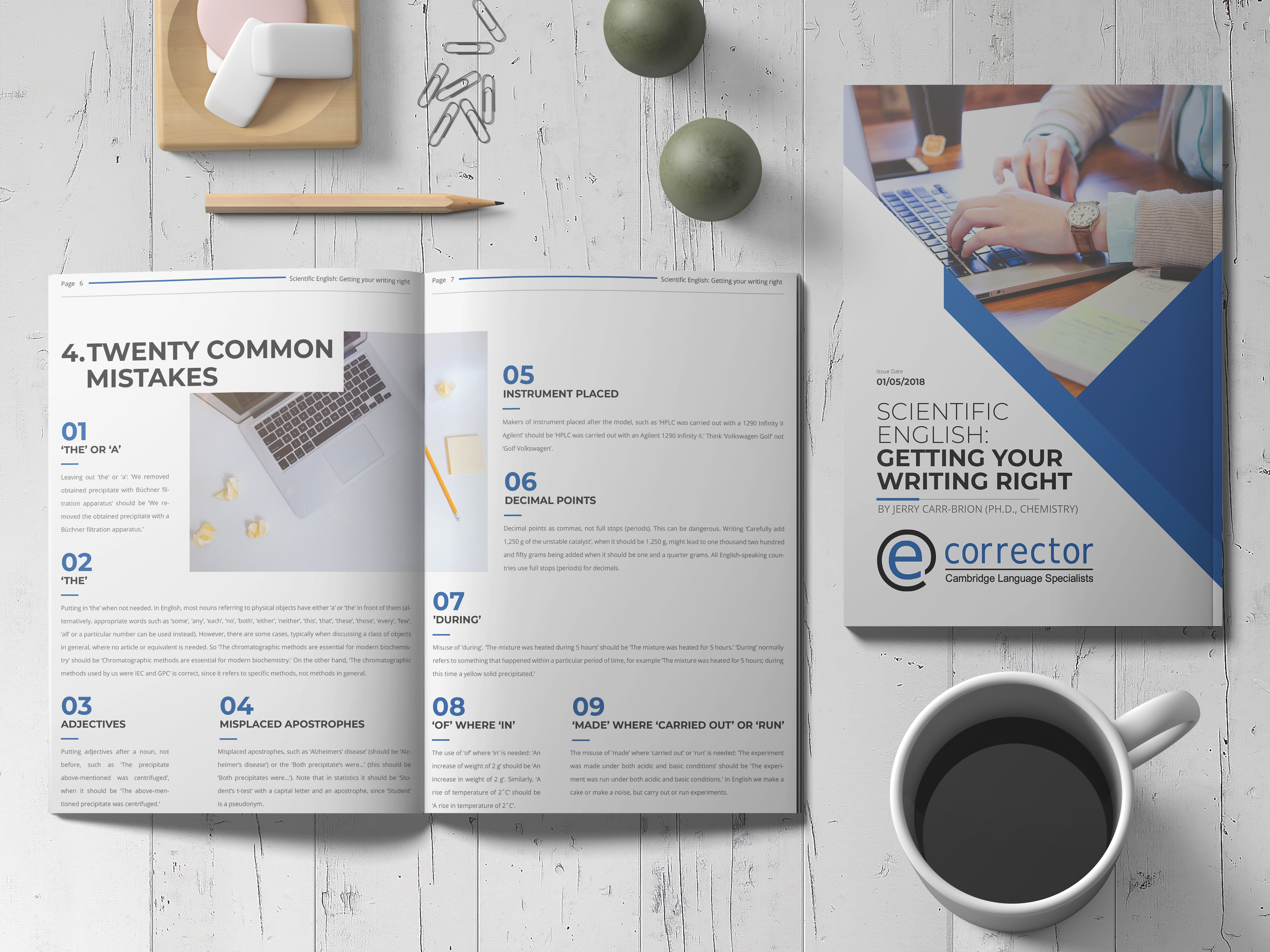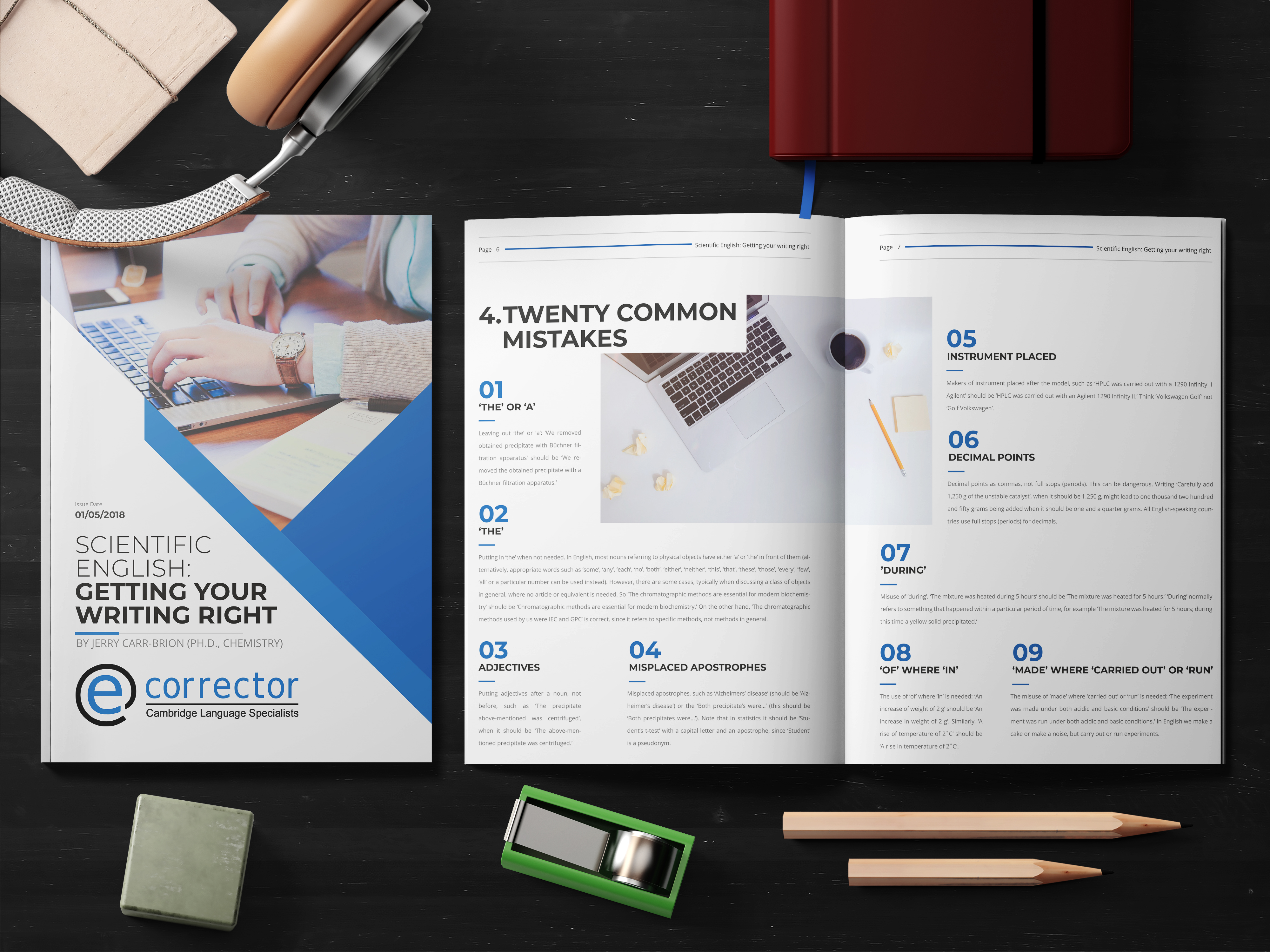
SCIENTIFIC ENGLISH: GETTING YOUR WRITING RIGHT
The guide, prepared by Jerry Carr-Brion, PhD, gives useful advice on planning your writing, guidance on style and common errors to be avoided.
You can find here:
- Things to do before you start writing
- Advice on style ? it should be simple, straightforward and as clear as possible
- Twenty Common Mistakes made by non-native speakers writers

INTRODUCTION
- Writing scientific English when it isn?t your first language can be a challenge. Having a native proofreader check your work is essential if you want to get your message across clearly and submit a professional-looking paper or report. However, as a proofreader myself, I realise that there are a number of steps that an author can take prior to copy-editing and proofreading to make the draft clearer. The fewer the mistakes at this point, the easier the copy-editing and proofreading tasks become and the less likely it is that alterations to the intended meaning will be accidently introduced. This article gives useful advice on planning your writing, guidance on style and common errors to be avoided.
THINGS TO DO BEFORE YOU START WRITING
- Check you?ve done all the experiments you need to. Before you do anything else, check that there aren?t any gaps in your work. It?s easy to miss out control experiments or full characterization of chemical or biochemical substances. It?s best to do these now rather than have a referee point them out later.
- Decide what needs to be in the paper and what doesn?t. It may be necessary to leave out some results that aren?t really relevant.
- Carefully read the ?instructions to authors? in the journal you aim to publish in. It?s worth looking at a number of papers in a similar field to yours in the journal to see how the rules are applied in practice. Follow the format and rules given, particularly with regard to the length of articles, abstracts, etc.
- Decide whether you want UK English or US English, setting this as your language preference for the whole document. As a proofreader, I often get documents where the language setting changes from UK English to US English in the middle of the document. So ??the successful modelling of a novel, coloured carotenoid-protein complex? (UK) in the abstract becomes ??the successful modeling of a novel, colored carotenoid-protein complex? (US) in the conclusion. Decide on one form of English and stick with it throughout. Incidentally, Australian and New Zealand English is virtually the same as UK English, if you happen to be writing for those countries.
Decide on the sections you want in your document. Typically these will be the following: abstract, introduction, experimental method, results, discussion, conclusion, references and appendices/diagrams. However, the exact format will depend on the type of document and where it will be published.
ADVICE ON STYLE
- Keep your writing simple and straightforward. Long sentences with several clauses often lead to confusion. They may be perfectly clear in your native language, but ambiguous when put into English. For example:
?The protein/ligand complex isolated by the microcentrifugation procedure and subjected to the stability protocol was bound using the coupling catalyst to the second ligand isolated by HPLC, giving a substance of lesser stability than was found in its previous state prior to the process.?
Here the proofreader is baffled: they guess that the ?substance? may refer to ?the protein/ligand complex?. However, they can?t rule out the possibility that ?substance? may refer to the second ligand. ?Process? might refer to ?microcentrifugation?, ?the stability protocol?, ?the binding? or the ?HPLC?. Was the ?HPLC? on the ?protein/ligand complex? or on just the ?second ligand?? After ten similar, ambiguous sentences, the proofreader is ready to quit in disgust.
Split up such sentences into two or three shorter ones, making sure that it?s clear what words such as ?substance? or ?process? refer to. If you have more than one complex you can always refer to them as ?complex 1?, complex 2? etc. You can always use ?i.e.? if the meaning is still unclear. A clearer version of the above long sentence might read:
Protein/ligand complex 1, which had previously been isolated by the microcentrifugation procedure, was bound using the coupling catalyst to a second ligand, giving protein/ligand complex 2. The second ligand had been isolated by HPLC prior to the coupling. Both complex 1 and complex 2 were subjected to the stability protocol, the former being found to be more stable.?
On the other hand, only ever using short, single-phrase sentences can seem somewhat childish. You don?t just have to use ?and? to link them. ?But?, ?yet? and ?while? are useful conjunctions when comparing two things. For example, the following piece has too many short sentences:
?The protecting groups underwent hydrolysis in the presence of dilute hydrochloric acid. Attempts to hydrolyse under basic conditions with sodium hydroxide were unsuccessful. Under these conditions decomposition occurred.?
This could be rewritten as:
?The protecting groups underwent hydrolysis in the presence of dilute hydrochloric acid, while attempts to hydrolyse under basic conditions were unsuccessful because decomposition occurred.?
- The bulk of a paper, including the experimental method and results, is normally written in the past tense. Avoid changing between the past and present tenses in the middle of a description:
‘The resulting mixture was centrifuged at 15,000 g in order to remove unwanted solids. This gives a largely clear peptide solution. The peptide was further purified by preparative reversed-phase HPLC.?
In the above example, ?gives? should be replaced with ?gave?.
In an introduction, you can write in the present tense about established ?facts? or uncontentious theories, e.g. ?Proteins are often purified by ion-exchange chromatography.? However, where there is controversy between scientists in a particular field, it?s best to use the past tense, e.g. ?Whereas Bloggs et al. (5) claimed that the antibiotic adopted a dimeric structure in basic solutions, Mustermann et al. (6) claimed that the trimer was the main form present.? Here there is no consensus, so neither claim should be reported as established fact, although both should be referenced if there is reasonable doubt about who is correct.
- Avoid overblown prose with unnecessary adjectives. A sentence such as ?The ever-changing past decades have seen a tremendous, continuous augmentation in the overall powers of chromatographic resolution? sounds less pompous if rewritten as ?Chromatographic resolution has greatly improved over recent decades.?

TWENTY COMMON MISTAKES
1. Leaving out ?the? or ?a?: ?We removed obtained precipitate with Büchner filtration apparatus? should be ?We removed the obtained precipitate with a Büchner filtration apparatus.?
2. Putting in ?the? when not needed. In English, most nouns referring to physical objects have either ?a? or ?the? in front of them (alternatively, appropriate words such as ?some?, ?any?, ?each?, ?no?, ?both?, ?either?, ?neither?, ?this?, ?that?, ?these?, ?those?, ?every?, ?few?, ?all? or a particular number can be used instead). However, there are some cases, typically when discussing a class of objects in general, where no article or equivalent is needed. So ?The chromatographic methods are essential for modern biochemistry? should be ?Chromatographic methods are essential for modern biochemistry.? On the other hand, ?The chromatographic methods used by us were IEC and GPC? is correct, since it refers to specific methods, not methods in general.
3. Putting adjectives after a noun, not before, such as ?The precipitate above-mentioned was centrifuged?, when it should be ?The above-mentioned precipitate was centrifuged.?
4. Misplaced apostrophes, such as ?Alzheimers? disease? (should be ?Alzheimer?s disease?) or the ?Both precipitate?s were?? (this should be ?Both precipitates were??). Note that in statistics it should be ?Student?s t-test? with a capital letter and an apostrophe, since ?Student? was a pseudonym.
5. Makes of instrument placed after the model, such as ?HPLC was carried out with a 1290 Infinity II Agilent? should be ?HPLC was carried out with an Agilent 1290 Infinity II.? Think ?Volkswagen Golf? not ?Golf Volkswagen?.
6. Decimal points as commas, not full stops (periods). This can be dangerous. Writing ?Carefully add 1,250 g of the unstable catalyst?, when it should be 1.250 g, might lead to one thousand two hundred and fifty grams being added when it should be one and a quarter grams. All English-speaking countries use full stops (periods) for decimals.
7. Misuse of ?during?. ?The mixture was heated during 5 hours? should be ?The mixture was heated for 5 hours.? ?During? normally refers to something that happened within a particular period of time, for example ?The mixture was heated for 5 hours; during this time a yellow solid precipitated.?
8.The misuse of ?made? where ?carried out? or ?run? is needed: ?The experiment was made under both acidic and basic conditions? should be ?The experiment was run under both acidic and basic conditions.? In English we make a cake or make a noise, but carry out or run experiments.
9. The use of ?of? where ?in? is needed: ?An increase of weight of 2 g? should be ?An increase in weight of 2 g?. Similarly, ?A rise of temperature of 2?C? should be ?A rise in temperature of 2?C?.
10. Use of verbs such as ?allow? or ?permit? with an infinitive (this has to be done carefully in English): ?Cooling the mixture allowed to obtain the product as a yellow precipitate? should be ?Cooling the mixture allowed us to obtain the product as a yellow precipitate? or ?Cooling the mixture allowed the product to be obtained as a yellow precipitate.? Take care with ?allowed to obtain?, ?allowing to obtain?, ?permitting to succeed?, etc. Normally just add ?us? to the phrase to turn it into correct English.
11. Using ?what? where ?which? is needed: ?The macrocycle contains unstable bonds, what result in its gradual decomposition when removed from the cell? should be ?The macrocycle contains unstable bonds, which result in its gradual decomposition when removed from the cell.?
12. Using plural verbs where a singular is needed: ?The examination of plasma and urine samples give useful information? should be ?The examination of plasma and urine samples gives useful information.? Similarly, ?A subset of these samples were analysed? should be ?A subset of these samples was analysed.? Think about which word is the subject of the sentence.
13. Misuse of ?however? as a conjunction: ?The protein was unstable in aqueous methanol, however it was stable in aqueous DMSO? should be ?The protein was unstable in aqueous methanol; however, it was stable in aqueous DMSO.? The word ?however? can?t be used as a conjunction, although one often finds this misuse, even with native English writers.
14. Using ?in? for columns, evaporators, etc.: ?The glycosides were separated in an HPLC column.? Here ?in? should be replaced by ?on?, ?with? or ?by? (any of these is fine for columns). Similarly, we remove solvent ?on a rotary evaporator? or ?with a rotary evaporator?. However, we do dry solids ?in an oven?, stir substances ?in a flask? and work ?in a glovebox? when necessary.
15. Use of a verb before the subject: ?For determining viral structure is useful electron microscopy? should be ?Electron microscopy is useful for determining viral structure.? In English verbs come before their subjects in some questions (?Was it possible??) or in some conditional phrases (?Only when the crystals fail to form should the anti-solvent be added?). In general, keep to the usual ?subject-verb-object? word order.
16. Use of ?works? to mean papers, studies or references: ?Various works have reported abnormal bacterial flora? should be ?Various papers have reported abnormal bacterial flora.?
17. Confusion between ?lead? and ?led?; ?These results lead us to change our approach, and so we started using platinum catalysts? should be ?These results led us to change our approach, and so we started using platinum catalysts.? ?Lead? is the present tense, while ?led? is the past tense and the form you?ll normally need to use.
18. Not using the perfect tense when it?s needed: ?Despite impure extracts being used for many years, the pure trisaccharide was not yet isolated? should be ?Despite impure extracts being used for many years, the pure trisaccharide has not yet been isolated.? The perfect tense often refers to past actions or situations where the time is not specified and continues into the present, e.g. ?Protein crystallization has been a challenge for many years.?
19. Using the perfect tense where the simple past is needed: ?The addition of acetic acid gave a precipitate, which has been removed by filtration? should be ?The addition of acetic acid gave a precipitate, which was removed by filtration.? Experiments are normally reported using the simple past (i.e. use ?was? or ?were? not ?has been? or ?have been?).
20. Use of double negatives. In English, two negatives words, such as ?not? or ?no?, make a positive statement. So ?We didn?t obtain no crystals on adding ammonia solution? means that some crystals were obtained. The sentence should be ?We didn?t obtain any crystals on adding ammonia solution.? Pink Floyd may have sung ?We don?t need no education?, but such phrases are best avoided in formal writing.
CONCLUSIONS
Writing technical English is a complex process, and an article such as this cannot possibly cover all the issues that can arise. Fortunately, there are many useful web resources dealing with English grammar and spelling, along with a large number of books published in many languages. However, so long as your meaning is unambiguous, a good proofreader will correct any mistakes, so you don?t have to write perfectly.
The more you practice writing in English, the more enjoyable the process will become.



Leave a Reply